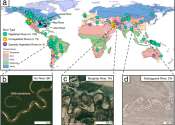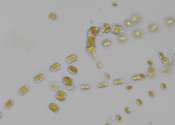Managing meandering waterways in a changing world
Just as water moves through a river, rivers themselves move across the landscape. They carve valleys and canyons, create floodplains and deltas, and transport sediment from the uplands to the ocean.

Just as water moves through a river, rivers themselves move across the landscape. They carve valleys and canyons, create floodplains and deltas, and transport sediment from the uplands to the ocean.
Earth Sciences
Apr 25, 2024
0
46

Earthquakes, volcanic activity, and sediment flux can trigger underwater landslides known as submarine slides, which can translate to tsunamis on the surface. Megaslides are extreme versions of these underwater events.
Earth Sciences
Apr 22, 2024
0
69

Submerged macrophyte invasions and microplastic pollution are major challenges in the context of global change and pose a serious threat to aquatic environments. The presence of microplastics in aquatic ecosystems alters ...
Ecology
Apr 18, 2024
0
12

As carbon dioxide accumulates in the atmosphere, the Earth will get hotter. But exactly how much warming will result from a certain increase in CO2 is under study. The relationship between CO2 and warming, known as climate ...
Earth Sciences
Apr 17, 2024
19
425

In a study published in Science Advances, scientists have used new lithium isotope (δ7Li) data to show that continental clay export promoted organic carbon burial and thus atmospheric oxygenation during the Cambrian period.
Environment
Apr 15, 2024
0
25

Ecosystem multifunctionality (EMF) is the ability of an ecosystem to provide multiple functions simultaneously. Microorganisms are proxies for soil communities and possess diverse functional traits that support multiple ecosystem ...
Ecology
Apr 12, 2024
0
8

New research at Åbo Akademi University, Finland, has managed to circumvent previous challenges in finding out how microalgae adapt to global warming by studying up to 60-year-old microalgae cells from the Archipelago Sea. ...
Evolution
Apr 8, 2024
0
285

A new method of measuring sediment thickness across Australia's interior offers a cost-effective and straightforward solution for estimating seismic hazard and resource potential while reducing carbon footprint, according ...
Earth Sciences
Apr 2, 2024
0
18

It carries more than 100 times as much water as all the world's rivers combined. It reaches from the ocean's surface to its bottom, and measures as much as 2,000 kilometers across. It connects the Indian, Atlantic and Pacific ...
Earth Sciences
Mar 27, 2024
0
61

University of Queensland researchers estimate there could be up to 7,000 tons of microplastics polluting vital ecosystems in Brisbane's Moreton Bay.
Environment
Mar 25, 2024
0
38
Sediment is any particulate matter that can be transported by fluid flow, and which eventually is deposited.
Sediments are most often transported by water (fluvial processes) transported by wind (aeolian processes) and glaciers. Beach sands and river channel deposits are examples of fluvial transport and deposition, though sediment also often settles out of slow-moving or standing water in lakes and oceans. Desert sand dunes and loess are examples of aeolian transport and deposition. Glacial moraine deposits and till are ice transported sediments.
This text uses material from Wikipedia, licensed under CC BY-SA